|
|
|
Sort Order |
|
|
|
Items / Page
|
|
|
|
|
|
|
| Srl | Item |
| 1 |
ID:
179282
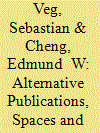

|
|
|
|
|
| Summary/Abstract |
Reviewing the extant literature on China's public sphere from the perspective of 20th-century history and social science, this introductory essay argues for the continued relevance of studying the publications and public practices associated with knowledge communities. By steering away from normative definitions and by envisaging publicness as a process, a connection can be explored between social discourses and political practices in China. Discursive communities, based on shared identity or sociability, may appear marginal, but at key moments they can play a unique role in modifying the dynamics of political events.
|
|
|
|
|
|
|
|
|
|
|
|
|
|
|
|
| 2 |
ID:
136288
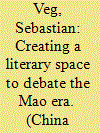

|
|
|
|
|
| Summary/Abstract |
Since the scar literature of the early 1980s, fiction and fictionalised autobiography have played an important role in bringing to light the mass violence of the Cultural Revolution. However, these texts remained within a well-defined framework in which the political system itself was not questioned. Over the last decade, by contrast, the Chinese literary field has focused more specifically on the 1950s, with works such as Yang Xianhui’s Chronicles of Jiabiangou (Tianjin, 2002), and Yang Jisheng’s Tombstone (Hong Kong, 2008). This paper focuses on Yan Lianke’s Four Books (Hong Kong, 2010), a full-fledged fictionalisation in a fantastic mode of the famine of the Great Leap Forward in a village on the Yellow River. Considering literature in the context of theories of the public sphere, it suggests that Yan’s book aims to broaden decisively the discussion on certain previously out-of-bounds aspects of the Mao era, an aim only partially thwarted by its failure to be published within mainland China. Four Books, like Yang Jisheng and Yang Xianhui’s works, thus represents an attempt to call into question the original legitimacy of the PRC polity and to create debate within the Chinese-speaking public sphere on the foundations of the current regime.
|
|
|
|
|
|
|
|
|
|
|
|
|
|
|
|
| 3 |
ID:
179283


|
|
|
|
|
| Summary/Abstract |
Situated far from coastal cities and foreign concessions, Chengdu yields insights into the role of the local press and its specific publics in the political evolution of the late Qing and early Republic. Despite its remote location, Chengdu developed its own modern press in the late Qing, relying on print entrepreneurs and modern journalists recruited from the ranks of the local literati and traditional sociability, in particular teahouses. They all played a role in forming a modern reading public which came to understand itself as a distinct local political community in dynamic interaction with national politics and transnational networks. The local press evinced three successive but intertwined ideals of publicness: as a link between the state and the people and a vector of enlightenment, as a professional forum for public opinion and as a tool for political mobilization. In solidifying public opinion around the local community, the press served as a forum and catalyst for political activism in the 1911 Railroad Protection movement and the 1919 May Fourth movement, events which were shaped as much by local dynamics as they were by national developments.
|
|
|
|
|
|
|
|
|
|
|
|
|
|
|
|
| 4 |
ID:
140637


|
|
|
|
|
| Summary/Abstract |
On July 17, 2015, People’s Daily announced that a new deputy director of the Chinese Communist Party’s Central Propaganda Department (the official translation has been changed to Department of Publicity in recent years) had appeared at a conference on children’s literature in Beijing. This was the first official notice that Tuo Zhen, the former director of propaganda in Guangdong province, had been promoted to a powerful position in the central government. Tuo had become famous in 2013 thanks to his personal intervention to cut and rewrite key passages of the newspaper Southern Weekend’s New Year’s editorial, hours before it went to press.
|
|
|
|
|
|
|
|
|
|
|
|
|
|
|
|
| 5 |
ID:
096980
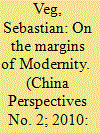

|
|
|
| 6 |
ID:
113768
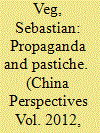

|
|
|
|
|
| Publication |
2012.
|
| Summary/Abstract |
The two Mao films of 2009 and 2011 set a new standard in the confluence of commercial and propaganda productions in terms of sheer scale. While they are not fundamentally new in repackaging propaganda as entertainment, or even in co-opting parodic elements within official discourse, this essay argues that, viewed against the background of recent policy speeches, they contribute to defining the new "mainstream socialist culture" set out as a cultural policy goal by Hu Jintao. By the same thrust, they redefine the figure of Mao and the role of the CCP in an attempt to stake out a popular consensus on the contemporary Chinese polity.
|
|
|
|
|
|
|
|
|
|
|
|
|
|
|
|
| 7 |
ID:
153347
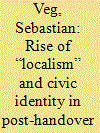

|
|
|
|
|
| Summary/Abstract |
While it was traditionally accepted that Hongkongers shared a form of pan-Chinese cultural identification that did not contradict their local distinctiveness, over the last decade Hong Kong has seen the rise of new types of local identity discourses. Most recently, “localists” have been a vocal presence. Hong Kong has – quite unexpectedly – developed a strong claim for self-determination. But how new is “localism” with respect to the more traditional “Hong Kong identity” that appeared in the 1970s? The present study takes a two-dimensional approach to study these discourses, examining not only their framework of identification (local versus pan-Chinese) but also their mode of identification (ethno-cultural versus civic). Using three case studies, the June Fourth vigil, the 2012 anti-National Education protest and the 2014 Umbrella movement, it distinguishes between groups advocating civic identification with the local community (Scholarism, HKFS) and others highlighting ethnic identification (Chin Wan). It argues that while local and national identification were traditionally not incompatible, the civic-based identification with a local democratic community, as advocated by most participants in recent movements, is becoming increasingly incompatible with the ethnic and cultural definition of the Chinese nation that is now being promoted by the Beijing government.
|
|
|
|
|
|
|
|
|
|
|
|
|
|
|
|
| 8 |
ID:
169196
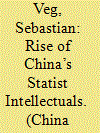

|
|
|
|
|
| Summary/Abstract |
Beginning in the 1990s, a number of elite Chinese intellectuals developed new critiques of liberalism. Within the orbit of Marxism, a group often called the “new left” mainly concentrated on economic liberalism and inequalities of wealth. Some of them also showed an affinity with the views of intellectuals referred to as statists. The statists’ three main ideas can be summarized as the superiority of political sovereignty over the rule of law, a critique of the “judicialization” of politics and the need to “repoliticize” the state, and a critique of universalism and an assertion of Chinese exceptionalism. Some of the legal scholars who developed these ideas are directly influenced by Carl Schmitt (1888–1985), an authoritarian German legal scholar and political theorist. Important texts by the current Chinese group of statist thinkers provide an intellectual background to the recent evolution in Party ideology.
|
|
|
|
|
|
|
|
|
|
|
|
|
|
|
|
| 9 |
ID:
132958
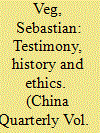

|
|
|
|
|
| Publication |
2014.
|
| Summary/Abstract |
The memory of the Anti-Rightist Movement has long been a blind spot in Chinese debates, with historiography limited to elite politics and little engagement with the repercussions of the movement at grassroots level. However, the publication of Yang Xianhui's 2003 book, Chronicles of Jiabiangou, marked a turning point. Based on extensive oral history interviews, Yang's book makes a substantive connection between the Anti-Rightist Movement and the establishment of dedicated laojiao camps such as Jiabiangou in Gansu province. Documenting what he claims was a policy of dehumanization, he suggests that intellectuals were far from the only victims of a movement characterized by its extra-legal procedures. Ordinary people were often drawn into it and were more able than intellectuals to resist the legitimizing discourse of loyalty to the Party to which many intellectuals continued to cling. For Yang, the testimonies of the Rightist victims in Jiabiangou provide a fruitful field in which to investigate the breakdown of elementary social trust in society during the Anti-Rightist Movement. Situated ambiguously between oral history and literary intervention, Yang's work has, together with other recent publications such as Tombstone, contributed to reopening the debate on Maoism in Chinese society today
|
|
|
|
|
|
|
|
|
|
|
|
|
|
|
|
| 10 |
ID:
091025
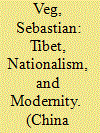

|
|
|
|
|
| Publication |
2009.
|
| Summary/Abstract |
In April 2008, one month after the Tibetan revolt of 14 March, the Tsinghua professor of intellectual history Wang Hui was interviewed by Twenty-first Century Economic Herald (Ershiyi shiji jingji baodao) about the events.
|
|
|
|
|
|
|
|
|
|
|
|
|
|
|
|
|
|
|
|
|